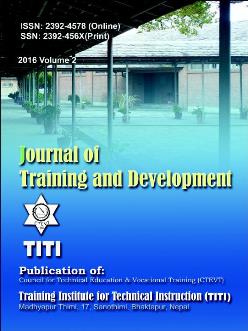A Mixed Method Study on Trainees Satisfaction Towards Training Services
DOI:
https://doi.org/10.3126/jtd.v2i0.15430Keywords:
Training, Trainees satisfaction, Training Institute for Technical InstructionAbstract
Training is a means to an end. It is not an end itself. Training is teaching or developing once knowledge, skills, capabilities and performance. In today’s world it is believe that training plays a vital role in developing human capabilities. So every training institute or training organization needs to understand their internal strengths, weakness and external opportunities and threats. Training institute for technical instruction (TITI) a pioneer institute in Nepal especially for providing skill based training in technical education and vocational training (TEVT) sector also need to identify its internal strengths, weakness, opportunities and threats. During its 25 years of excellence in training throughout Nepal and abroad its necessary to know TITI trainees satisfaction towards training services.
In this context, we pursued to gain an in-depth understanding on satisfaction of trainees towards training services of TITI in respect towards teaching methodology. Kathmandu, Bhaktapur and Lalitpur districts of Kathmandu Valley, Nepal were selected for the study. Eight key participants voluntarily participated in this study where as 343 respondents were surveyed using five points likert scale. A parallel mixed method approach was employed to gain insight into TITI trainee’s satisfaction towards TITI training services in respect to teaching methodology.Downloads
Downloads
Published
How to Cite
Issue
Section
License
Authors who publish with this journal agree to the following terms:
- Authors retain copyright and grant the journal right of first publication with the work simultaneously licensed under a Creative Commons Attribution License that allows others to share the work with an acknowledgement of the work's authorship and initial publication in this journal.
- Authors are able to enter into separate, additional contractual arrangements for the non-exclusive distribution of the journal's published version of the work (e.g., post it to an institutional repository or publish it in a book), with an acknowledgement of its initial publication in this journal.
- Authors are permitted and encouraged to post their work online (e.g., in institutional repositories or on their website) prior to and during the submission process, as it can lead to productive exchanges, as well as earlier and greater citation of published work (See The Effect of Open Access).




